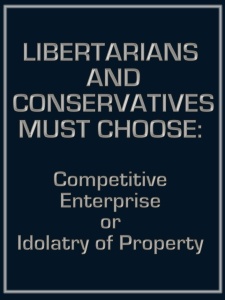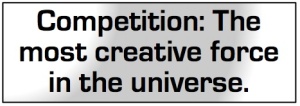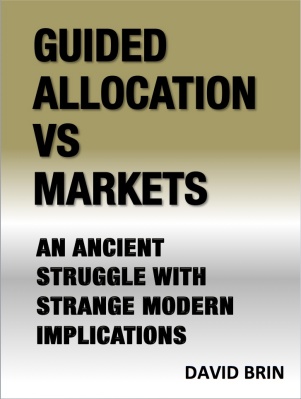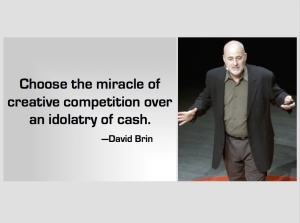Even conservatives now admit that conservatism has changed. Take the Ronald Reagan who Republican activists idolize in abstract; in real life he raised taxes, increased regulations, signed environmental laws, and (worst of all) negotiated countless compromise give-and-take, pragmatic measures in tandem with a Congress run by the other party. As did Barry Goldwater and William F. Buckley, giants who argued with genteel courtesy and who revered both knowledge and intellect, especially science. Even the most fervid Tea Party aficionado would avow that today’s GOP has little room for such things – as Goldwater and Buckley themselves proclaimed, to their dismay, before they died.
 In this analysis, I’d like to focus on one of the directions that conservatism has gone a-wandering. But note first: I’ll try to do this without taking a single position that could fairly be called even slightly left-of center – by the old standards at least.
In this analysis, I’d like to focus on one of the directions that conservatism has gone a-wandering. But note first: I’ll try to do this without taking a single position that could fairly be called even slightly left-of center – by the old standards at least.
My entire critique will be from what used to be a completely conservative perspective. You’ll know this by the historical figure whom I cite above all others.
It begins provocatively, with prominent online commentator John Robb, who offers a simple… and clearly-correct… explanation for the gross mismanagement of the U.S. economy in the 21st Century – an appraisal that seems both tragically on-target and stunningly ironic. Ironic in ways I plan to elaborate — and I expect you’ll not look at the hoary old “left-vs-right” axis in the same way, ever again.
For starters, Robb shows that the patron saints of modern libertarianism and conservatism — including Adam Smith and Friedrich Hayek — were right in their core message…
…. proving that today’s peculiarly myopic libertarians and conservatives are wrong in theirs.
The Smithian Fundamental
 In order to grasp that apparent contradiction, let’s start by asking: what did Smith and Hayek say?
In order to grasp that apparent contradiction, let’s start by asking: what did Smith and Hayek say?
No, it wasn’t “laissez faire” or social darwinism or extolling the virtues of greed. Though both men praised private enterprise and market initiative, they did not share today’s idolatry of personal and family wealth as the fundamental sacrament of economics. Those who most-frequently bandy Smith’s name appear never to have cracked open a page of “The Wealth of Nations” or ‘The Theory of Moral Sentiments.”
Rather, Adam Smith essentially founded our modern phase of the Western Enlightenment by anchoring a central postulate — one that Pericles and Locke discussed earlier, and that others, like Hayek, later embellished. The postulate that human beings are supreme rationalizers and self-deceivers.
Moreover, across 4,000 years we’ve seen that whenever a small group of men become powerful enough to control an economy and command-allocate its resources, they will do so according to biased perceptions, in-group delusions and fatally limited knowledge. Whether they do the normal oligarchic thing — cheating for self-interest — or else sincerely try to “allocate for the good of all,” they will generally do it badly. As a blatant recent example, Robb cites the collapse of the Soviet Union.
“The reason for this failure was that the Soviets relied on central planning. A system of economic governance where small group of people — in the Soviet Unions case bureaucrats — had all the decision making power. They decided what was spent and where. Even with copious amount of information, they decided badly. Why did they decide badly? The massive economy of a modern superstate is too complex for a small group of people to manage. Too much data. Too many uncertainties. Too many moving parts.”
Indeed, the transformation of modern China from a Maoist calamity to a mercantilist success story began with their abandonment of nit-picking central planning in favor of capitalist-style enterprise. Of course, the Chinese ruling caste retained overall control, “guiding” categories of credit and investment while executing a grand mercantilist strategy, the same process that Japan accomplished masterfully, during its own rapid primary and secondary phases of export-driven economic development.
Alas, for Japan, (but as a few of us forecast in the 1980s), national development eventually hits a tertiary phase when simple-minded, predatory mercantilism breaks down. If history and human nature are any guide, the Chinese will hit the same “wall” when economic complexity surpasses the ability of any planner-elite to comprehend or manage. For all his faults – and the many ways he’s misinterpreted – Friedrich Hayek understood this well. He showed how it turns skilled planners into smug blunderers.
Now this barrier can shift, as computers and sophisticated models let rulers extend their period of competence a bit longer. (It helps, apparently, that nearly all of the top Chinese leaders began their careers as engineers, responsible for actual goods or services, not as lawyers, politicians or “business majors.”)
Still, however you look at it, there is no way that the old ruling principle that held in 99% of human societies — “Guided Allocation of Resources” or GAR — could possibly work in a tertiary economy as intricate as the United States. As Robb continues:
“The only way to manage an economy as complex as this is to allow massively parallel decision making. A huge number of economically empowered people making small decisions, that in aggregate, are able to process more data, get better data (by being closer to the problem), and apply more brainpower to weighing alternatives than any centralized decision making group.”
Now all of this may sound surprisingly well… “libertarian”… given that both Robb and I are highly critical of today’s right! But bear with us, because what’s at issue is a fundamental conflation and betrayal of the very essence of those movements. The ultimate irony and hypocrisy.
What Robb describes here is the central discovery, not only of Smith and Locke, but of Benjamin Franklin and the American framers… as well as Galileo and the founders of modern science. Ever since civilization began, nearly all societies were dominated by centralized oligarchies, priesthoods or hierarchies who ruled on policy, resource-allocation and Truth for 4,000 years of general incompetence mixed with brutal oppression.
Today, by sharp contrast, all three of the Enlightenment’s great arenas — democracy, markets and science — feature a revolutionary structure that broke with the oligarchic past. The old, arrogant, top-down approach was replaced with something else. Something that great Pericles described 2,000 years earlier, during the brief Athenian Renaissance.
 The most creative force in the universe. The principle that propels evolution, in nature, and that brought humanity into existence — Competition.
The most creative force in the universe. The principle that propels evolution, in nature, and that brought humanity into existence — Competition.
Elsewhere I’ve called the Enlightenment’s principal tool Reciprocal Accountability (RA). But it really is just another way to say “get everybody competing.”
By dividing and separating power and — more importantly — empowering the majority with education, health, rights and knowledge, we enabled vast numbers of people to participate in markets, democracy and science. This has had twin effects, never seen in earlier cultures.
1) It means everybody can find out when a person stumbles onto something cool, better or right, even if that person came from a poor background.
2) It allows us to hold each other accountable for things that are wrong, worse or uncool, even when the bad idea comes at us from someone mighty.
Never perfectly implemented(!) — this reciprocally competitive system nevertheless dealt far better than any predecessor with that problem of human delusion. None of us can see and correct all our own errors, past a cloud of rationalizations. But when RA is healthy, then criticism flows. And others will happily point out your errors, for you. (What a deal!) And I’m sure you’re happy to return the favor.
The result? An Enlightenment Civilization fostered by Smith, Locke, Franklin etc., but propelled by tens of millions of eager participants. Inarguably the most successful of all time, cutting through countless foolish notions that held sway for millennia — like the assumption that your potential is predetermined by who your father was — while unleashing creativity, knowledge, freedom, and positive-sum wealth to a degree that surpassed all other societies, combined.
Even the most worrisome outcomes of success, like overpopulation, wealth stratification and environmental degradation, come accompanied by good news. Like the fact that so many of us are aware, involved, reciprocally critical, and eager to innovate better ways.
Lip Service to Wisdom
So, what’s that irony I spoke of, earlier? How does this central principle turn around and bite today’s libertarians and conservatives, proving many of them fools?
Clearly, Everything I’ve said, so far, ought to make a libertarian or conservative happy! Indeed, my nonfiction book The Transparent Society is all about how open (Hayekian) information flows can empower reciprocal accountability and competition, the things that make democracy and markets and science great. (There have never been humans more inherently competitive than scientists; try talking to one, some time.)
So where’s the problem? The problem is that it’s all lip service on the right! Those who most-loudly proclaim Faith In Blind Markets (FIBM) are generally also those proclaiming idolatry of private property as a pure, platonic essence, a tenet to be clutched with religious tenacity, as it was in feudal societies. Obdurate, they refuse to see that they are conflating two very different things.
Private property – as Adam Smith made clear – is a means for encouraging the thing he really wanted: fair and open competition. But anyone who actually read Smith also knows that he went on and on about that “fair and open” part! Especially how excessive disparities of wealth and income destroy competition. Unlike today’s conservatives, who grew up in a post-WWII flattened social order without major wealth-castes, Smith lived immersed in class-rooted oligarchy, of the kind that ruined markets, freedom and science across nearly 99% of human history. He knew the real enemy, first hand and denounced it in terms that he never used for mere bureaucrats.
When today’s libertarians praise the creative power of competition, then ignore the propertarianism that poisons it, we are witnessing historical myopia and dogmatic illogic, of staggering magnitude.
The Irony of Faith in Blind Markets
 When Adam Smith gets oversimplified into a religious caricature, what you get is “faith in blind markets” – or FIBM – a dogma that proclaims the State should have no role in guiding economic affairs, in picking winners of losers, or interfering in the maneuvers or behavior of capitalists. Like many caricatures, it is based on some core wisdom. As Robb points out. The failure of Leninism shows how state meddling can become addictive, excessive, meddlesome and unwise. There is no way that 100,000 civil servants, no matter how well-educated, trained, experienced, honest and well-intentioned, can have enough information, insight or modeling capability to replace the market’s hundreds of millions of knowing players. Guided Allocation of Resources (GAR) has at least four millennia of failures to answer for.
When Adam Smith gets oversimplified into a religious caricature, what you get is “faith in blind markets” – or FIBM – a dogma that proclaims the State should have no role in guiding economic affairs, in picking winners of losers, or interfering in the maneuvers or behavior of capitalists. Like many caricatures, it is based on some core wisdom. As Robb points out. The failure of Leninism shows how state meddling can become addictive, excessive, meddlesome and unwise. There is no way that 100,000 civil servants, no matter how well-educated, trained, experienced, honest and well-intentioned, can have enough information, insight or modeling capability to replace the market’s hundreds of millions of knowing players. Guided Allocation of Resources (GAR) has at least four millennia of failures to answer for.
But in rejecting one set of knowledge-limited meddlers — 100,000 civil servants — libertarians and conservatives seem bent on ignoring market manipulation by 5,000 or so aristocratic golf buddies, who appoint each other to company boards in order to vote each other titanic “compensation packages” while trading insider information and conspiring together to eliminate competition.
Um… in what way is this kind of market “blind”? True, you have gelded the civil servants who Smith praised as a counter-balancing force against oligarchy. But the 5,000 golf buddies — despite their free market rhetoric — are still reverting to GAR. To guided allocation, only in even smaller numbers, operating according to oligarchic principles of ferocious self-interest that go back to at least Nineveh.
If you want to explore this further, including how the notions of “allocation” and “faith in blind markets” get weirdly reversed, and how Smith and Hayek are betrayed by the people who tout them the most, see my article: Guided Allocation vs. Markets: An Ancient Struggle with Strange Implications.
Hence, at last, the supreme irony. Those who claim most-fervent dedication to the guiding principle of competition and enterprise — our neighbors who call themselves conservative and libertarian — have been talked into conflating that principle with something entirely different. Idolatry of private wealth, sacred and limitless. A dogmatic-religious devotion that reaches its culmination in the hypnotic cantos of Ayn Rand. Or in the Norquist pledge to cut taxes on the rich, without limit and despite the failure of Supply Side predictions ever, ever, every coming true.
An idolatry that leads, inevitably to the ruination of all competition and restoration of the traditional human social order that ruled our ancestors going back to cuneiform tablets — Feudalism.
Growing past the “left-right axis”
Let’s be clear. Every aspect of my argument, today, was from the perspective of an admirer of Adam Smith, of market enterprise, science and freedom. Not a single thing referred to socialist or left-wing parts of the spectrum. Sure, I hinted that some liberal endeavors — e.g. mass education, civil rights, child nutrition and national infrastructure etc. — empowered greater numbers of citizens to join the fair and open process of Smithian competition. But Smith was called “the first liberal” and liberalism isn’t “lefty” anyway.
No. This indictment of today’s right was made entirely from the core postulates of the libertarian right. Indeed, what Robb points out – and that I elaborated here – is a reason for sincere libertarians and conservatives to awaken and rebel against the hijacking of their movements.
 This is an internal matter, a cancer within libertarianism and conservatism. If there are still honest and smart men and women within those old and noble traditions, they should think carefully, observe and diagnose the illness. They should face the contradiction. Discuss the conflation. Choose the miracle of creative competition over an idolatry of cash.
This is an internal matter, a cancer within libertarianism and conservatism. If there are still honest and smart men and women within those old and noble traditions, they should think carefully, observe and diagnose the illness. They should face the contradiction. Discuss the conflation. Choose the miracle of creative competition over an idolatry of cash.
They should stand up.














Your supreme irony is no such thing. It is predicated on a notion about libertarianism and conservatism that is false. It may be a great rhetorical talking point to suggest that right wingers and libertarians idolize money and property to the expense of everyone else, but such a suggestion conflates corrupt, crony capitalism with moral and fair capitalism. (It is worth noting that Sara Palin has been arguing this very distinction at her appearances.) I’ve never encountered or read anyone on the conservative side who advocated fraud as a legitimate basis for economic or political activity. (That is not the case on the left, i.e. Saul Alinsky.)
Ben: Absence of evidence is not evidence of absence. Libertarian philosophy places property rights above all other rights. The primacy of property rights implicitly endorses any actions taken to achieve right to property.
Hi Ben. The way I read it, moral and fair capitalists are exactly the audience Brin is trying to appeal to in this post, so I’m glad that you read and commented on this, even if it was just to defend your team. Setting aside the rhetorical claim of conservative idolatry for the moment, what do you think of Brin’s central assertion that the concentration the vast majority of U.S. wealth in a small percentage of hands constitutes a dangerously selective form of central planning, and that central planning almost always fails to adapt efficiently enough to selection pressures over the long run? If we agree on that assertion, maybe we can find some common ground on the left/right polemics. If you don’t find it persuasive, what are the grounds for your disagreement? I don’t have a dog in this fight. I’m just a fan of civilization, and it seems that civilization works best when its built on cooperative truth seeking.
In fairness to Ben, many conservatives and libertarians would not immediately answer “private property” as their number one god, if asked to name their concerns. Libertarians would likely respond with a negative, rather than a positive – derision of overweening government. Conservatives would react with another negative – everything that is even remotely liberal or intellectual, especially all the knowledge castes, from teachers to medical doctors to civil servants to attorneys to professors… but especially scientists.
But you see, this does boil down to defense of unlimited private property. Because when you eliminate government and all the knowledge castes, what elite is left standing? You got it. The money oligarchy that finances the anti government and anti science etc propaganda from Heritage and AEI and Fox.
Look past the reflex — the reflex to assume that what I am saying here is somehow “leftist.” because it isn’t! Barry Goldwater and William F. Buskley said many of these things, before they died. “Conservatives and libertarians” who have never read Adam Smith would be surprised to learn that Smith knew which elite was most dangerous to freedom and to markets and to competition.*
The same elite that squashed freedom in 99% of cultures for 6000 years. And when I meet a libertarian who starts by admitting that fact, then I know I’ve met someone I can at least talk to.
DB
* (And note that EVERYTHING I said here was in praise of competition! Any “libertarian” who defends the destroyers of competition does not deserve the name.)
David brin (signing in as a guest.
As a libertarian, I would say that the foundation of my philosophy is a positive- you own yourself. In a just and free society, no person or group has an a priori right to your life. You may cede this right by your actions but you are not born a vassal to the King or the Commons.
I would also say that I do see a danger in the excessive consolidation of decision making into a minority… even if that minority came to that place of power through the market. The bigger danger from that quarter is when those financial giants can use a loosely fettered state to regulate in their favor and ensure that their failings do not bring them down. “Too big to fail” is a grotesque abrogation of incompetent business decisions as a market pressure.
Absent the government’s wholesale selling of protection and privilege, the market would lead to incompetent decision maker’s failure and replacement by those with greater ability. If a more diffuse decision making process is more efficient and less error prone then that would succeed in the market so long as the few can’t buy their ascendancy from the state.
The biggest difference between an entire economy planned by a government and even a large subset of the same economy planned by 5000 billionaires is that half of those billionaires can fail without taking the country down with them. This only works if the government’s roll is to see that no force of fraud is used- to only see that everyone plays fair, not deciding who wins and who loses.
Punishing those who compete too well is no less caustic to the system than is running a protection racket for those who can no longer compete well enough.
I also have to say that the knowledge castes are the engines of our amazing standard of living. Absent the scientists and engineers, the free market could only have given us a small portion of what we have today. Sure it would have been many times more than any command economy but not the hundreds of times more that we actually have achieved. Absent the good teachers, professors and even attorneys the reach of knowledge would been greatly limited.
Both the free market and the knowledge caste are necessary for the Enlightenment… neither alone is sufficient.
what’s amazing is how stupid and dogmatic most people are who cannot figure out what you just wrote for themselves in the general sense.
what you wrote can be summed up in a paragraph. where you leave off is where many academics pick up, and sadly, where many lay-people fear to tread. a discussion about how to rearrange the property system to promote true competition.
i can give you a list of points of things to start on.
—-complete scaling back of financial ‘enginneered’ innovation, which has it’s innovative root as the very law itself, rather than any new technology.
this essentially means the end of the securitization, and banning of reprocessing of mortgages, or any other underlying streams of income ( student loan/credit card/recievable payments)
—–complete renewal of the patent system, industry by industry , technology by technology, field by field
—–complete renewal of the copyright and trademark system revamped for the digital age. possible acceptance of ‘no way out’ for changing this system.
—–complete change in corporate personhood as a root mechanism for funding lobbying activities of government on behalf of anti-competitive enterprise
—-the changing of the legal system allowing citizens to bring anti-trust lawsuits on behalf of the public without government approval. concommitant change of powers of government with resepct to granting injunctions ( giving gov stronger power ) and less power with respect to fining and tax companies.
the list goes on. but none of this will happen in any meaningful manner short of revolution, and even then, one assumes it could.
—-
I’m always struck by the same paradox of freedom asserted in libertarianism. The constructs that give us such freedom seem to also give equality, (as Smith spoke of), therefore they represent a social contract which anyone who therefore ‘serves’ the goal of freedom will have to abide with.
I’ve always seen it as a war metaphor, libertarians would die fighting social programs, but they would not die to protect them, even if protecting them would free them from war and suffering and give them the security to be free. That just makes (fundamentalist) libertarianism out to be a rather stupid and paradoxical, ‘endless war’ ideology.
It’s an odd paradox in my eyes, which I have never seen resolved. We can all get behind libertarian principles that have achieving more freedom as a goal (because that logically implies social contracts & equality like free universal health care, free education, etc.), but the neo-libertarian fundamentalism (a sort of religious nihilism really), is just stupid.